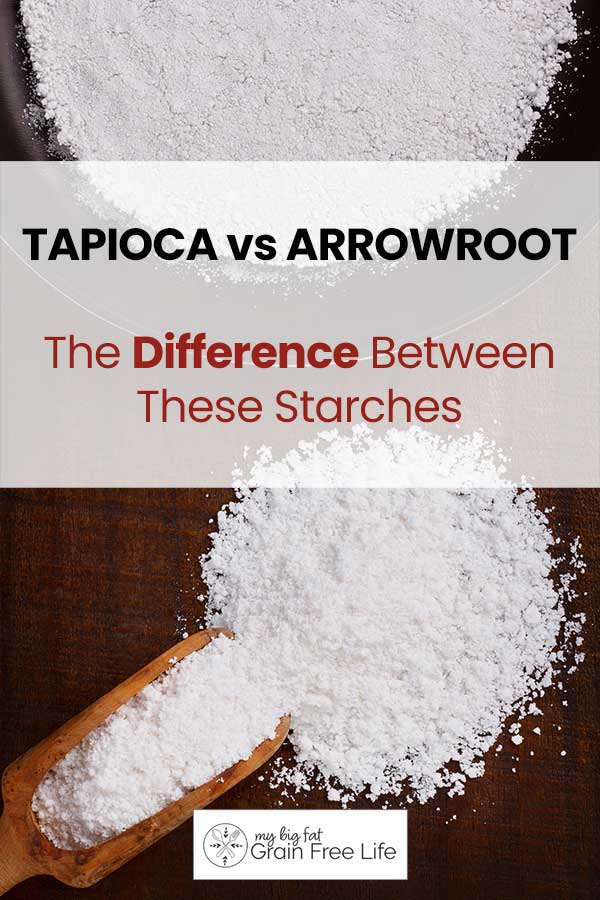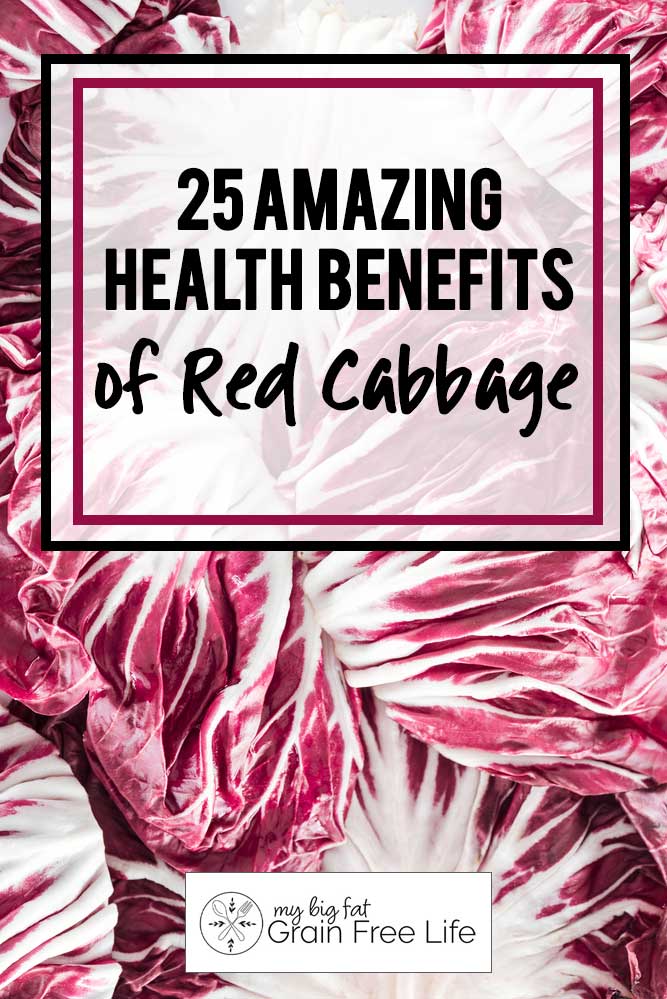43 Amazing Arugula Health Benefits & Nutrition Facts
This post may contain affiliate links. If you make purchase after clicking a link, I may receive a commission at no extra cost to you.
Last Updated on September 11, 2023
The arugula health benefits are quite astounding. If you enjoy eating salads, you should consider tossing in some arugula to beef up the nutrients and and a nice kick of pepper. If you are not sure what types of health benefits there are to eating arugula, you may be surprised. Read on to learn about 43 different ways eating arugula can benefit your health.
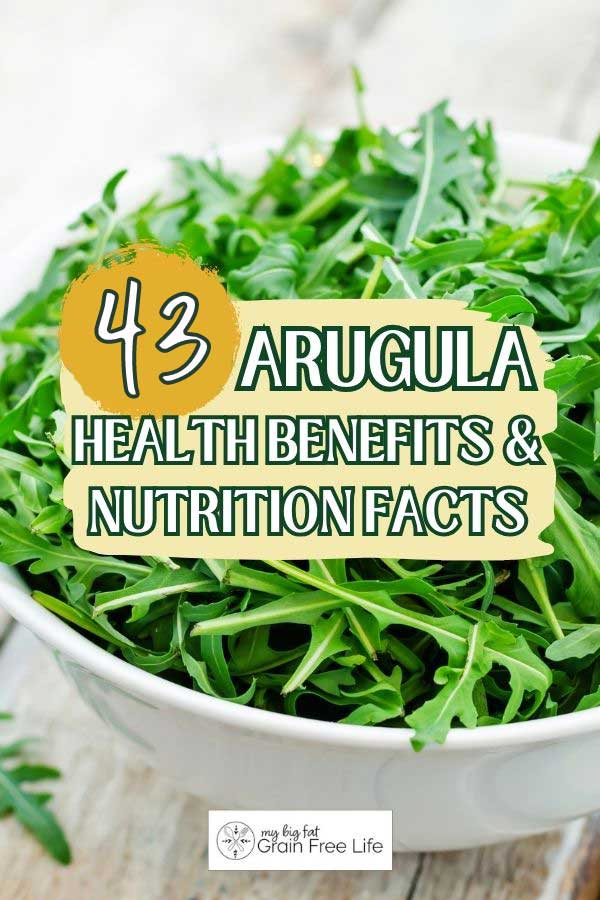
Arugula Health Benefits
You might be wondering “What are the benefits of arugula?”. You may be amazed when you learn that the health benefits of arugula are so broad. In addition to being a nutrient-rich food full of nutrients, vitamins, and minerals, this delicious green can help you live longer and even boost your libido!
Before we get into all the ways arugula can benefit your health, let’s learn about arugula and take a look at the nutrition it contains.
What Is Arugula?
This green leafy vegetable is a member of the Brassicaceae family, which includes other cruciferous vegetables like broccoli, brussels sprouts, kale, and cabbage. Arugula leaves are typically long and slender, with a deep green color and a slightly jagged edge.
When you make healthy food choices, are on the autoimmune protocol, or another special diet, adding arugula or even the tiny arugula microgreens to your salads and smoothies can provide extra nutrition.
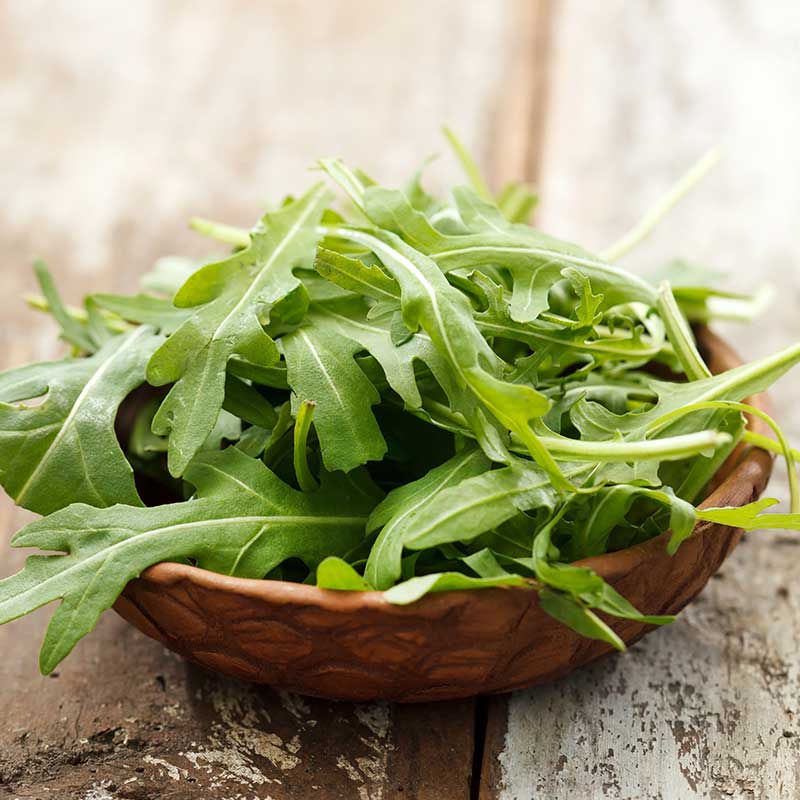
Arugula Nutrition
Here is a list of some key vitamins and minerals found in arugula:
- Vitamin K: Arugula is rich in vitamin K, providing approximately 109% of the daily recommended intake per 100 grams.
- Vitamin C: This leafy green contains a moderate amount of vitamin C, which is essential for boosting the immune system, promoting healthy skin, and aiding in collagen production.
- Folate: Arugula is a good source of folate, providing around 14% of the recommended daily intake.
- Calcium: With approximately 160 milligrams of calcium per 100 grams, arugula can contribute to your daily calcium intake.
- Iron: Arugula contains a modest amount of iron, which is vital for the production of red blood cells and oxygen transportation throughout the body.
- Potassium: This leafy green vegetable is also a good source of potassium, providing approximately 369 milligrams per 100 grams.
- Magnesium: Arugula contains magnesium, an essential mineral that plays a role in numerous biochemical reactions in the body.

Health Benefits of Arugula
Arugula, also known as salad rocket or rucola, is one of several leafy green vegetables that are full of important nutrients. From its distinct peppery taste to its deep green color, arugula is not only delicious but also provides a number of health benefits.
It is an excellent source of vitamins A, C, and K, providing essential antioxidants that support a healthy immune system, promote collagen production, and aid in blood clotting. Additionally, arugula is rich in folate, which is crucial for cell growth and DNA synthesis.
It also contains minerals like calcium, potassium, and magnesium, which contribute to maintaining healthy bones and a strong heart.
Here are 43 impressive health benefits of including arugula in your diet:
Nutrient-rich
Arugula is loaded with essential vitamins and minerals, such as vitamin K, vitamin C, vitamin A, folate, calcium, and potassium.
Rich in Chlorophyll
One of arugula’s standout qualities is its rich chlorophyll content, which contributes to its intense green hue. Consuming green leafy vegetables high in chlorophyll, such as arugula, can have positive effects on our overall well-being.
Antioxidant Powerhouse
Arugula is a great source of antioxidants and can help protect your cells from oxidative damage caused by harmful free radicals.
May Promote Heart Health
The nitrates in arugula may help folks with high blood pressure and improve overall heart health.
Contains Anti-inflammatory Properties
Arugula contains compounds that have anti-inflammatory effects, which can reduce the risk of chronic diseases.

Promotes Bone Health
High in vitamin K, arugula aids in bone metabolism and supports bone health.
Has Cancer-fighting Potential
Some studies suggest that the phytochemicals in arugula may help protect against certain types of cancer.
Promotes Good Digestive Health
The good source of fiber content in arugula promotes healthy digestion and prevents constipation.
May Aid in Weight Management
This low-calorie vegetable can help you feel full and satisfied, aiding in weight management.
May Boost Energy
Arugula contains B-vitamins that play a vital role in energy production.
Promotes Good Eye Health
The antioxidants lutein and zeaxanthin found in arugula contribute to eye health and may help prevent age-related macular degeneration.
May Improve Skin Health
The vitamins and minerals in arugula support healthy skin, promoting a youthful appearance.
Provides Immune System Support
Arugula is packed with vitamin C, which boosts the immune system and helps fight off infections.
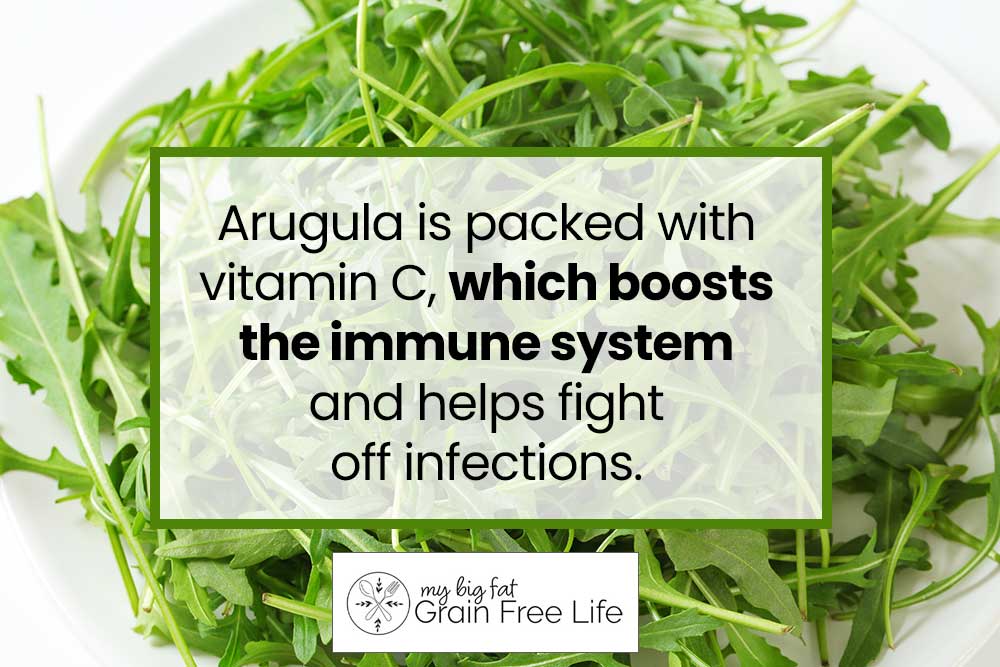
May Aid in Hydration
With a high water content, arugula helps keep you hydrated.
Promotes Detoxification
Arugula’s sulfur-containing compounds aid in liver detoxification processes.
May Help with Diabetes Management
Arugula’s low glycemic index can help regulate blood sugar levels.
May Reduce Inflammation
The vitamin E and omega-3 fatty acids in arugula have anti-inflammatory properties.
Promotes Brain Health
Arugula contains folate, which is essential for brain function and may help prevent cognitive decline.
May Improve Circulation
The nitrates in arugula help relax blood vessels, promoting better circulation.
Promotes Respiratory Health
Arugula’s anti-inflammatory properties may benefit respiratory conditions like asthma.
Promotes Hair Health
The vitamins and minerals in arugula support strong, healthy hair.
May Reduce Risk of Stroke
Arugula’s high nitrate content may help reduce the risk of stroke.
May Improve Fertility
Arugula’s folate content contributes to fertility and healthy fetal development.
Contains Antimicrobial Properties
Arugula contains compounds that have natural antimicrobial effects.
Alkalizing Effect
Despite its slightly peppery taste, arugula has an alkalizing effect on the body, so it’s an alkaline food.
May Improve Cognitive Function
The antioxidants in arugula may help protect the brain from age-related cognitive decline.
Helps Blood Clot Prevention
Arugula’s vitamin K content plays a role in blood clotting and preventing excessive bleeding.
May Reduce Risk of Chronic Diseases
Arugula’s rich nutrient profile may help reduce the risk of chronic diseases like diabetes, heart disease, and certain cancers.
May Improve Liver Health
Arugula’s detoxifying properties support optimal liver function.
Has Anti-aging Effects
Arugula’s antioxidants help combat the effects of aging and oxidative stress.
Aids in Muscle Recovery
The iron content in arugula aids in muscle recovery and prevents fatigue.
May Enhance Athletic Performance
Arugula contains a high concentration of nitrates, which have been linked to improved exercise performance. Nitrates are converted into nitric oxide in the body, which helps widen blood vessels, enhance blood flow, and increase oxygen delivery to working muscles.
This can result in improved endurance, reduced fatigue, and enhanced overall athletic performance.
May Provide Aphrodisiac Qualities
There are certain nutrients, such as an amino acid called phenylalanine in arugula that could enhance libido and overall sexual health.
Reduced Risk of Osteoporosis
Arugula’s bone-strengthening nutrients contribute to a reduced risk of osteoporosis.
May Provide Allergy Relief
Arugula’s anti-inflammatory properties may provide relief from allergies and asthma symptoms.
Can Improve Sleep Quality
Arugula’s magnesium content promotes relaxation and better sleep quality.
Promotes Mental Well-being
The B-vitamins in arugula are essential for maintaining good mental health.
Contains Anti-arthritic Properties
Arugula’s anti-inflammatory effects may help alleviate arthritis symptoms.
Promotes Dental Health
The calcium and vitamin C in arugula contribute to strong teeth and gums.
May Reduce Risk of Anemia
Arugula’s iron content helps prevent iron-deficiency anemia.
May Improve Kidney Function
Arugula’s diuretic properties may improve kidney function and prevent urinary tract infections.
Can Reduce risk of Gallstones
Regular consumption of arugula may help reduce the risk of gallstones.
Promotes Overall Well-being
Incorporating arugula into your diet can contribute to your overall health and well-being.
Arugula vs. Other Greens
Let’s take a look at how arugula compares to other greens in terms of taste and nutrients.
Taste-wise, arugula offers a distinct, slightly peppery and nutty flavor that sets it apart from other leafy greens. This distinctive taste adds a delightful kick to salads, sandwiches, and various dishes, making it a favorite among those seeking a bit of zest in their meals.
In comparison, other greens like spinach have a milder and slightly sweet taste, while kale tends to be more earthy and slightly bitter.
Compared to its leafy green counterparts, arugula generally has a lower calorie content, making it a great choice for those watching their weight. However, it is worth noting that arugula may not be as high in certain nutrients, such as iron, when compared to spinach or kale.

Storage Tips for Arugula
Arugula is a delicate green vegetable that requires proper storage to maintain its freshness and taste. To help you enjoy your arugula for as long as possible, here are some storage tips:
Dump & Sort: Lay out the arugula and remove any yellow, limp, or slimy pieces to keep the other healthy leaves from deteriorating.
Rinse and dry: Before storing arugula, give it a gentle rinse to remove any dirt or debris. After rinsing, make sure to dry the leaves thoroughly using a salad spinner or by patting them gently with a clean kitchen towel.
Store in a plastic bag: Place the dry arugula leaves in a resealable plastic bag. Squeeze out any excess air before sealing the bag to prevent moisture buildup, which can cause the leaves to wilt quickly.
Add a paper towel: To absorb any excess moisture and help keep the arugula fresh, place a dry paper towel inside the bag. The paper towel will help maintain the crispness of the leaves.
Refrigerate promptly: Arugula is highly perishable, so it’s essential to refrigerate it as soon as possible. Store the bag of arugula in the vegetable crisper drawer of your refrigerator, where the temperature is slightly cooler and more consistent.
Avoid overcrowding: Arugula leaves are delicate and can easily bruise or wilt if packed too tightly. Ensure that the bag is not overcrowded, allowing enough space for air circulation around the leaves.
Use within a few days: While arugula can stay fresh for up to a week when stored properly, it is best to consume it within a few days for the best flavor and texture. As time passes, the leaves may start to yellow or wilt, indicating that they are no longer at their peak freshness.
Potential Risks of Eating Arugula
When it comes to enjoying arugula, there are a few potential risks of consuming in large quantities that you should be aware of. Here are a few things to keep in mind:
Allergies: Arugula belongs to the brassica family, which includes vegetables like broccoli and cabbage. Some individuals may have allergies to this family of plants, leading to symptoms such as itching, hives, or difficulty breathing. If you have a known allergy to brassicas, it’s best to avoid arugula.
Contamination: Like any leafy green, arugula can potentially be contaminated with harmful bacteria, such as E. coli or Salmonella. To minimize this risk, it’s crucial to thoroughly wash arugula before consuming it.
Oxalate content: Arugula contains oxalates, which can contribute to the formation of kidney stones in susceptible individuals. If you have a history of kidney stones or are at a higher risk of developing them, it’s advisable to moderate your consumption of arugula and consult with a healthcare professional about your specific dietary needs.
Medication interactions: Arugula, like many other leafy greens, contains vitamin K, which plays a role in blood clotting. If you’re taking blood-thinning medications, such as warfarin, it’s important to be mindful of your arugula consumption as it may interfere with the effectiveness of these medications.
It’s recommended to consult with your healthcare provider for personalized advice.
Ways to use Arugula
Add a peppery kick to your salads: Arugula’s distinctive flavor pairs perfectly with other vegetables and greens, such as spinach, adding a refreshing and tangy twist to your salads. Top with various types of vinegar or a homemade vinaigrette for a nice kick to your salad experience.
Top pizzas with arugula: After baking your pizza, sprinkle a handful of fresh arugula over the top for a vibrant and flavorful finishing touch.
Create a delicious pesto: Blend arugula, garlic, pine nuts, Parmesan cheese, and olive oil to make a unique and flavorful pesto sauce. Use it as a spread on sandwiches, a dip for vegetables, or a sauce for pasta.
Incorporate arugula into your sandwiches: Place a handful of arugula leaves on your favorite sandwich for an extra layer of crunch and a burst of peppery goodness.
Make a green smoothie: Blend arugula with fruits like pineapple, mango, or banana, and some yogurt for a to increase the health benefits of smoothies.
Add it to your pasta dishes: Toss cooked pasta with sautéed garlic, cherry tomatoes, and arugula for a simple yet delicious meal. The arugula will wilt slightly, adding a fresh peppery element to the dish.
Create a unique arugula-based soup: Puree arugula with vegetable broth, onions, and herbs to make a flavorful and nutritious green soup. Serve it hot or chilled for a refreshing appetizer or light meal.
Use it as a garnish for soups and stews: Sprinkle some freshly chopped arugula on top of your favorite soups and stews just before serving to add a pop of color and a hint of spiciness.
Make arugula chips: Toss arugula leaves with olive oil, salt, and pepper, then bake them in the oven until crispy. These homemade arugula chips make for a healthy and addictive snack.
You might also want to check out: Complete Guide on Greens: Collards, Mustards & Turnip Greens
Arugula FAQs
Is it okay to eat arugula every day?
Eating arugula every day can be a great addition to your diet. Not only does it have a distinct peppery flavor that can add a punch to your meals, but it also offers numerous health benefits.
Can I eat too much arugula?
While arugula is undoubtedly a nutritious green vegetable, moderation is key. Consuming excessive amounts of arugula can lead to digestive issues such as bloating, gas, and diarrhea. Additionally, its high vitamin K content may interfere with certain medications, especially blood thinners.
Is arugula healthier raw or cooked?
When raw, arugula retains its vitamin C content, which is essential for immune health and collagen production. It is also rich in antioxidants, such as beta-carotene and lutein, which help protect against cellular damage. Raw arugula is a great addition to salads and sandwiches, adding a peppery flavor and a refreshing crunch.
Cooking arugula can result in a softer texture and milder taste. Heat can diminish some of the vitamin C content, but it also enhances the absorption of minerals and other nutrients like iron and calcium. Lightly sautéing or steaming arugula can make it more palatable for those who find its raw taste too strong.
Final Summary
Adding arugula to your diet can benefit your health in a variety of ways, as we discussed above. From spicing up your salads by adding a peppery flavor and adding to smoothies for extra nutrition, to using it as a pizza topping or making a pesto with it, there are so many ways you can enjoy eating it.



